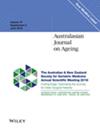A Most Significant Change evaluation of a new co-designed tool to measure holistic well-being in consumers of community aged care services
Abstract
Objectives
To evaluate a Wellbeing Check-in tool and process for use with BlueCare's home care package (HCP) clients by care and well-being practitioners. The tool had been co-designed with HCP clients and trialled with 15 clients.
Methods
The Most Significant Change (MSC) methodology was used to gather stories from five practitioners, five HCP staff and seven clients. A workshop with senior staff was held to determine themes and whether the tool met its aims.
Results
Out of 22 MSC stories, 18 were judged in scope by workshop participants. Eight themes were then identified. Four themes reflected the content of the narratives (i.e. what was discussed): Isolation and connection; Grief; Faith/explicit spirituality; and Client preference. The other four themes reflected the process (i.e. what the discussions meant to participants): Being there/Meaningful conversations; Impact on significant others; New insight; and Purpose of the check-in. These eight themes largely reflected the aims of the Wellbeing Check-in tool in terms of providing a means to optimise connectedness, well-being and spiritual care in accordance with the client's needs, goals and preferences. Unanticipated findings included its benefits for family members and uncertainty about the aim or value of the tool, which highlighted the need for BlueCare to be clear about the purpose of the tool in promoting it to clients and their informal carers.
Conclusions
The Wellbeing Check-in tool was found to be fit for purpose. A tool used flexibly to prompt discussion about well-being can be helpful to clients and pastoral care staff.


 求助内容:
求助内容: 应助结果提醒方式:
应助结果提醒方式:


